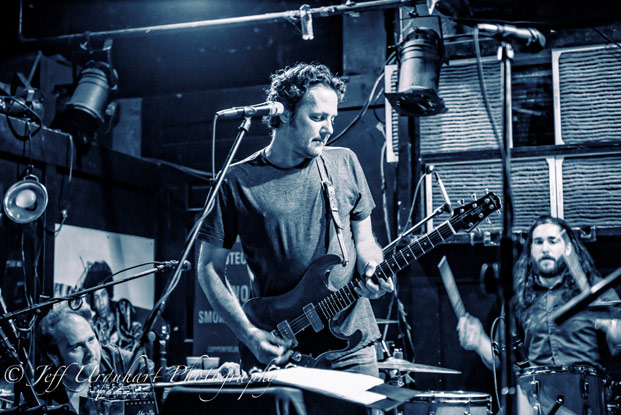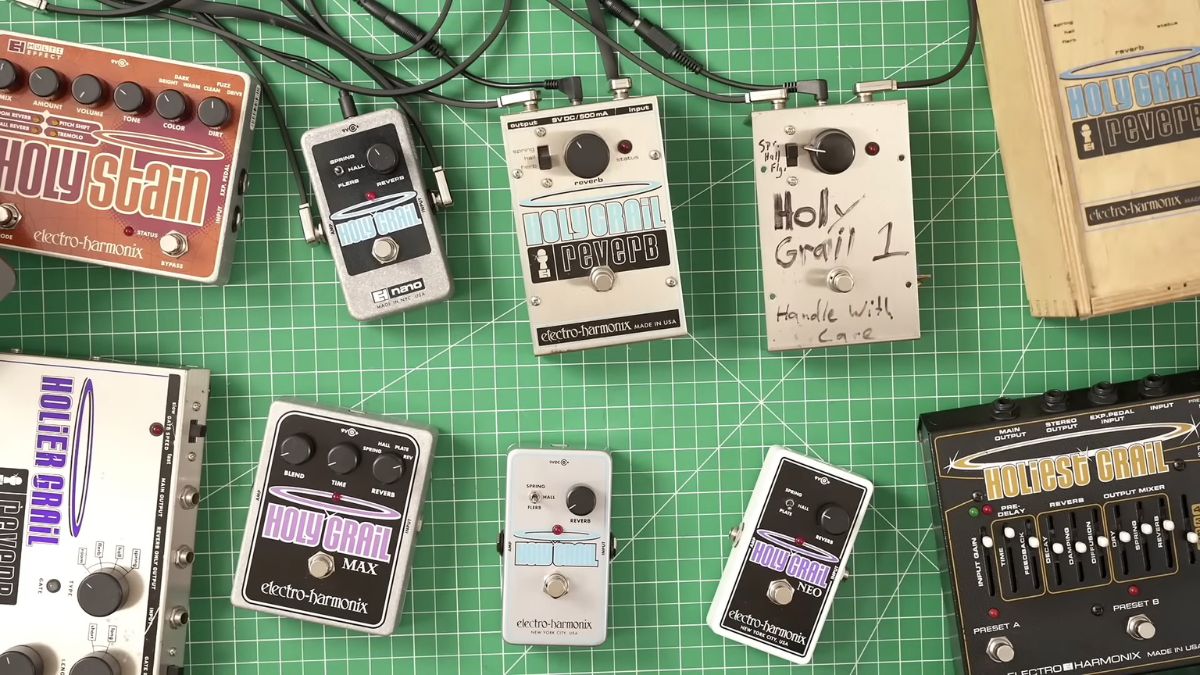Marc Ford Plugs the Fuzz Back In: New Album and Kickstarter

Aspiring guitar players have been trying to cop Marc Ford’s licks for years.
But perhaps the best lesson they could learn from Ford sounds more like a driving lesson than a classic riff: Stay focused on the road ahead and don't spend your time looking in the rearview mirror.
While journalists and promoters the world over may still refer to Ford as “former Black Crowe,” Ford doesn’t rely on his laurels to make his way in life. A player who’s definitely been there and back, Ford is enjoying his family, his friends, his faith … and a good fuzz.
There’s plenty going on in Marc’s world, including a new studio album and a Kickstarter effort to support it. Read up.
We want to talk about the new album you’re doing, but first let’s bring folks up to speed on what you’ve had going on recently. Over the last few months, you’ve done some local live shows, and I wanted to ask about the gigs you played with Mike Campbell and his side project the Dirty Knobs. From the clips I’ve seen, it looks like you guys were having fun.
Yeah, we did three here in Southern California back in November and it was a blast. We all had a great time … it was just a big guitar geek fest, you know? [laughter]
Mike seems to be a very giving soul in a live setting like that: “Here, take the wheel.”
All the latest guitar news, interviews, lessons, reviews, deals and more, direct to your inbox!
Yeah, he’s like that in person, too. Mike’s very cool–I like him a lot. He’s probably one of the best guitar players we have–with the kind of personality that gets behind the other players and supports them … and doesn't ever say too much. It’s just a perfect thing.
And then we have the studio work you’ve been involved with, both producing and playing. I’ve been listening to Chris Lizotte’s newest album, Grace and Mercy. How many records does this make that you’ve done together?
Three, as far as Chris’ own albums.
How do you separate your role as producer from that of the lead guitar player in that setting?
Well … with Chris, we’ve been playing together for so long now that it’s like nobody really produces. We just go in with the people we know, put some mics up and count it off. Literally, there were close to no overdubs on this record. Our buddy John Schreiner engineered it and he’s got great ears. We recorded it in a couple of days–and mostly it’s just us playing live.
How did that compare to the process of recording your wife Kirsten’s new album, I Belong to You?
It was pretty similar, really. Kirsten’s took a little bit longer because I had more roles on that record. I did the bass and most of the guitar, so we had to overdub things, but it was still pretty quick. I’m really happy with the result. It was cool to have my son Elijah come in to sing and play on it.
We’ve talked about this in the past: what you two have is pretty special, as fathers and sons don’t always work out musically.
I know. [laughs] I’ve said it before: music will tell on you. If there’s anything going between people, it either gets intensified or gets worked out with the music.
So, in regards to working things out: when you're in the studio with your wife–she’s the artist and you’re the producer and the guitar player and the bassist …
Ahhh … [laughter]
How do you handle the multi-role thing and still go home to dinner together?
You know, for years and years, it was hard for us to sit down and make music together … it was just within the last few years that we’ve worked it out. And now it’s an easy thing for us to do. And if anything too tough needed to be said, I brought in a third party. [laughter]
A wise man.
Yeah well, it's been a long time … so I learned a couple things. [laughter]
Some people live and learn; others just live.
And some people just learn and never live, you know?
There you go. OK, there’s no way I can turn this into a Guitar World piece without asking you: if someone looks down by your feet these days, what are they going to find on the pedal board?
Well, they’d be hard-pressed to find a board, for one thing. [laughter]
Just plug in and go these days?
Yeah, pretty much. Like, when I drive to Long Beach to get together with the guys and rehearse, I’ll usually bring one pedal and see what I can get out of it—see what I can do. I want to figure out the parameters of each pedal and then I’ll try pairing them up to see what works with each other.
So what have you been playing through of late?
Oh, let’s see … I have a couple fuzzes from Richard at Monsterpiece and I’ve been using one of them, the MK II, live and in the studio.
Is that what you used for the Mike Campbell shows?
Yeah, just that and a wah. The Monsterpieces are awesome pedals. When it comes to Fuzz Face-style pedals, MJM’s London Fuzz is a great one I’ve been using—very musical and rich-sounding. Fuzz Faces can flub out on you, but the MJM London stays tight and big.
What about overdrives or boosts?
I have a Power Booster from Steve at Buffalo FX–I’ve always wanted one of those, being a Jeff Beck fan. It’s an intense pedal … it’s everything you want, believe me. [laughs] It’s 18 volts and so strong and loud. I’m loving that one as well.
Are you hitting the Buffalo with a fuzz?
I haven't used them together yet; I’m using either one or the other. It’s tough: the Buffalo is like the germanium fuzzes—they want to see the guitar. The Power Booster doesn't seem to like a wah in front of it, whereas with most of the fuzzes you can get away with a wah pedal first.
Any other pedals in particular you’ve been experimenting with?
Yeah. Mike at Analogman sent me this new compressor he’s building now, and I never thought I’d like a compressor much. This thing is great: he put the attack knob on the outside, along with a mix knob so you can balance the compressed sound with the dry sound. It’s really nice. You can just put a hint of compression on there if you want. And Mike also sent me his MK IV fuzz.
The Sun Bender?
Yep, and it’s great, too. So I am deep in fuzz on this new record we’re about to do. [laughter]
So those are some of the pedals you’ll be going into the studio with. As far as guitars go, you have your signature model Asher …
That’s right. And Wayne at Headstrong Amps, who I’ve been working with for the last 10 years or so, is flying out for the sessions. His Lil’ King is great. And we're talking about doing a signature amplifier.
It definitely sounds like this will be a harder, more rocking collection of songs, compared to 2014’s Holy Ghost. That was a great album–soft and powerful at the same time. It often felt like you were letting the listener peer over your shoulder and read your journal.
I really loved the Holy Ghost record; it was an … intense record to have to sing every night, you know? It was kind of a sobering experience. It's time to go out and have some fun with the guys—get back to a little bit more lightheartedness.
Your co-pilots for the new album will be the Neptune Blues Club: John Bazz on bass; Mike Malone on keys and harmonica; drummer Anthony Arvizu. Anyone who doesn't know about the Neptune Blues Club can dig into your back catalog, as there’s a studio album and a bunch of live downloads. How would you describe what they bring to this project?
I guess you could call it “grown-man music.” [laughter] We’re all at an age where we don't have any reason to play together except that we love to do it. That’s how Neptune started: it was like a club where we just got together and played without any real plans. It’s been—what, 10 or 12 years now?—since we first got together and we still love it.
Is the material all written, or will you guys be working things up in the studio?
Uh, yes, and yes. [laughter] We probably already have more than we need, but I’m still finishing some stuff and we’re still working on some things. Whatever floats to the top is what will go on there. There are a couple of cover songs I want to do … but I don't want to give too much away. [laughs]
You’ll be recording at San Francisco’s Tiny Telephone Studios with John Vanderslice at the controls.
I had the chance to work with John for the first time a few months ago–he’s great. He’s so talented and so quick … it just worked really well. I asked him on the spot about doing this album.
And we want folks to know they can get involved and help make it happen by going to your Kickstarter page.
That’s right. People have been really supportive and we appreciate it. I’ve felt like Neptune really hasn’t had its day yet. All we wanted to do in the beginning was just play in some local bars and make people dance—now we’re gonna make some new music and get out there … take it to the people.
A former offshore lobsterman, Brian Robbins had to wait a good four decades or so to write about the stuff he wanted to when he was 15. Today he’s a freelance scribe, cartoonist, photographer and musician. His home on the worldwide inner tube is at brian-robbins.com (And there’s that Facebook thing too.)
